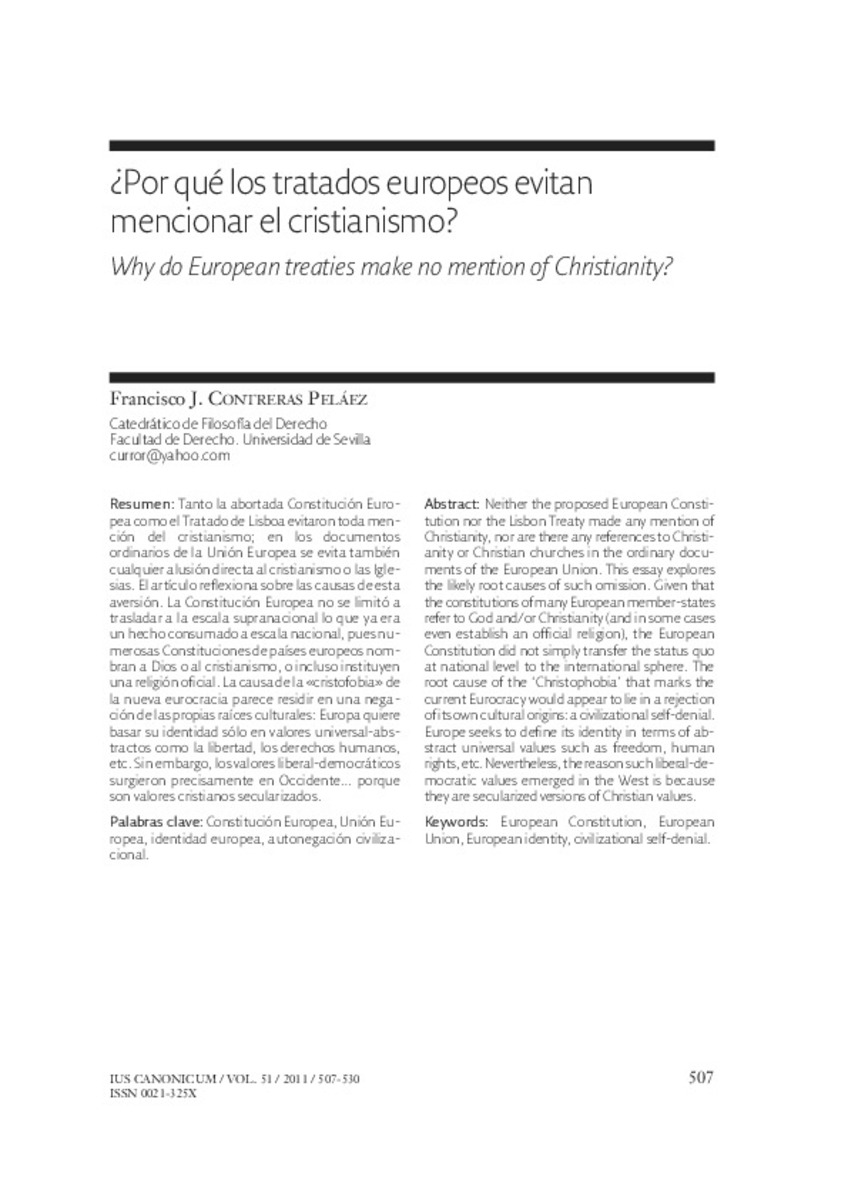Full metadata record
| DC Field | Value | Language |
|---|---|---|
| dc.creator | Contreras, F. (Francisco) | - |
| dc.date.accessioned | 2014-12-01T13:55:09Z | - |
| dc.date.available | 2014-12-01T13:55:09Z | - |
| dc.date.issued | 2011 | - |
| dc.identifier.citation | IUS CANONICUM, 2011, 51, N. 102, págs. 507-530. | es_ES |
| dc.identifier.issn | 0021-325X | - |
| dc.identifier.uri | https://hdl.handle.net/10171/37127 | - |
| dc.description.abstract | Tanto la abortada Constitución Europea como el Tratado de Lisboa evitaron toda mención del cristianismo; en los documentos ordinarios de la Unión Europea se evita también cualquier alusión directa al cristianismo o las Iglesias. El artículo reflexiona sobre las causas de esta aversión. La Constitución Europea no se limitó a trasladar a la escala supranacional lo que ya era un hecho consumado a escala nacional, pues numerosas Constituciones de países europeos nombran a Dios o al cristianismo, o incluso instituyen una religión oficial. La causa de la «cristofobia» de la nueva eurocracia parece residir en una nega- ción de las propias raíces culturales: Europa quiere basar su identidad sólo en valores universal-abs- tractos como la libertad, los derechos humanos, etc. Sin embargo, los valores liberal-democráticos surgieron precisamente en Occidente... porque son valores cristianos secularizados. | es_ES |
| dc.description.abstract | Neither the proposed European Consti- tution nor the Lisbon Treaty made any mention of Christianity, nor are there any references to Christianity or Christian churches in the ordinary docu- ments of the European Union. This essay explores the likely root causes of such omission. Given that the constitutions of many European member-states refer to God and/or Christianity (and in some cases even establish an official religion), the European Constitution did not simply transfer the status quo at national level to the international sphere. The root cause of the ‘Christophobia’ that marks the current Eurocracy would appear to lie in a rejection of its own cultural origins: a civilizational self-denial. Europe seeks to define its identity in terms of abstract universal values such as freedom, human rights, etc. Nevertheless, the reason such liberal-de- mocratic values emerged in the West is because they are secularized versions of Christian values. | es_ES |
| dc.language.iso | spa | es_ES |
| dc.publisher | Instituto Martín de Azpilcueta | es_ES |
| dc.rights | info:eu-repo/semantics/openAccess | es_ES |
| dc.subject | Constitución Europea | es_ES |
| dc.subject | Unión Europea | es_ES |
| dc.subject | Identidad europea | es_ES |
| dc.subject | Autonegación civilizacional | es_ES |
| dc.subject | European Constitution | es_ES |
| dc.subject | European Union | es_ES |
| dc.subject | European identity | es_ES |
| dc.subject | Civilizational self-denial | es_ES |
| dc.title | ¿Por qué los tratados europeos evitan mencionar el cristianismo? | es_ES |
| dc.title.alternative | Why do European treaties make no mention of Christianity? | es_ES |
| dc.type | info:eu-repo/semantics/article | es_ES |
| dc.identifier.doi | 10.15581/016.51.2571 | es_ES |
Files in This Item:
Statistics and impact
Items in Dadun are protected by copyright, with all rights reserved, unless otherwise indicated.






